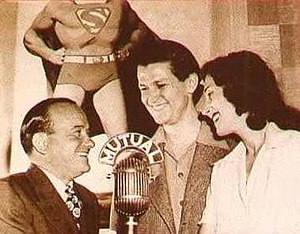Superman (radio)

National (DC) Comics Publisher Harry Donenfeld (left) with Bud Collyer and Joan Alexander.
|
|
| Other names | "Superman" |
|---|---|
| Genre | Serial, Drama |
| Running time | 15 min, 30 min |
| Country | USA |
| Language(s) | English |
| Home station | WOR |
| Syndicates | MBS, ABC |
| Starring |
Bud Collyer, Joan Alexander |
| Announcer | Jackson Beck |
| Written by | George Putnam Ludlam |
| Recording studio | New York |
| Air dates | February 12, 1940 to March 1, 1951 |
| No. of episodes | 2088 |
| Sponsored by | Kellogg's Pep Cereal |
| Podcast | Stream from Archive.org |
The Adventures of Superman was a long-running radio serial that originally aired from 1940 to 1951 starring the DC Comics character Superman.
The serial came to radio as a syndicated show on New York City's WOR on February 12, 1940. On Mutual, it was broadcast from August 31, 1942, to February 4, 1949, as a 15-minute serial, running three or, usually, five times a week. From February 7 to June 24, 1949 it ran as a thrice-weekly half-hour show. The series shifted to ABC Saturday evenings on October 29, 1949, and then returned to afternoons, twice-a-week on June 5, 1950, continuing on ABC until March 1, 1951. In all, 2088 original episodes of The Adventures of Superman were aired on American radio.
Created by Jerry Siegel and Joe Shuster, the Man of Steel first appeared in Action Comics #1 in 1938. The following year, the newspaper comic strip began and four audition radio programs were prepared to sell Superman as a radio series. When Superman was first heard on radio less than two years after the comic book appearance, the character took on an added dimension with Bud Collyer in the title role. During World War II and the post-war years, the juvenile adventure radio serial, sponsored by Kellogg's Pep, was a huge success, with many listeners following the quest for "truth and justice" in the daily radio broadcasts, the comic book stories and the newspaper comic strip. Airing in the late afternoon (variously at 5:15pm, 5:30pm and 5:45pm), the radio serial engaged its young after-school audience with its exciting and distinctive opening, which changed slightly as the series progressed. Most familiar today is the television opening, which copied the radio opening from 1945 onward (save for "and the American Way" line, which was an even later addition) but the most-oft-heard radio opening through the mid-1940s was:
...
Wikipedia
